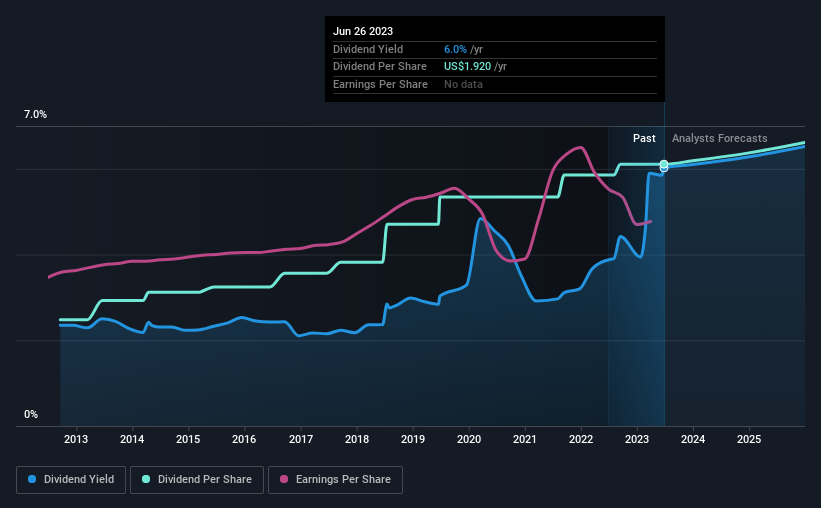U.S. Bancorp (NYSE:USB) is about to trade ex-dividend in the next 2 days. The ex-dividend date is one business day before a company’s record date, which is the date on which the company determines which shareholders are entitled to receive a dividend. It is important to be aware of the ex-dividend date because any trade on the stock needs to have been settled on or before the record date. In other words, investors can purchase U.S. Bancorp’s shares before the 29th of June in order to be eligible for the dividend, which will be paid on the 17th of July.
The company’s upcoming dividend is US$0.48 a share, following on from the last 12 months, when the company distributed a total of US$1.92 per share to shareholders. Calculating the last year’s worth of payments shows that U.S. Bancorp has a trailing yield of 6.0% on the current share price of $31.88. If you buy this business for its dividend, you should have an idea of whether U.S. Bancorp’s dividend is reliable and sustainable. So we need to investigate whether U.S. Bancorp can afford its dividend, and if the dividend could grow.
View our latest analysis for U.S. Bancorp
If a company pays out more in dividends than it earned, then the dividend might become unsustainable – hardly an ideal situation. U.S. Bancorp paid out 51% of its earnings to investors last year, a normal payout level for most businesses.
When a company paid out less in dividends than it earned in profit, this generally suggests its dividend is affordable. The lower the % of its profit that it pays out, the greater the margin of safety for the dividend if the business enters a downturn.
Click here to see the company’s payout ratio, plus analyst estimates of its future dividends.
Have Earnings And Dividends Been Growing?
Companies that aren’t growing their earnings can still be valuable, but it is even more important to assess the sustainability of the dividend if it looks like the company will struggle to grow. If earnings decline and the company is forced to cut its dividend, investors could watch the value of their investment go up in smoke. It’s not encouraging to see that U.S. Bancorp’s earnings are effectively flat over the past five years. Better than seeing them fall off a cliff, for sure, but the best dividend stocks grow their earnings meaningfully over the long run.
Many investors will assess a company’s dividend performance by evaluating how much the dividend payments have changed over time. In the last 10 years, U.S. Bancorp has lifted its dividend by approximately 9.4% a year on average.
Final Takeaway
Is U.S. Bancorp worth buying for its dividend? U.S. Bancorp’s earnings are effectively flat over recent years, even as the company pays out more than half of its earnings to shareholders as dividends. In sum this is a middling combination, and we find it hard to get excited about the company from a dividend perspective.
If you want to look further into U.S. Bancorp, it’s worth knowing the risks this business faces. Every company has risks, and we’ve spotted 1 warning sign for U.S. Bancorp you should know about.
A common investing mistake is buying the first interesting stock you see. Here you can find a full list of high-yield dividend stocks.
What are the risks and opportunities for U.S. Bancorp?
U.S. Bancorp, a financial services holding company, provides various financial services to individuals, businesses, institutional organizations, governmental entities and other financial institutions in the United States.
Rewards
-
Trading at 46.1% below our estimate of its fair value
-
Earnings are forecast to grow 8.39% per year
Risks
-
Shareholders have been diluted in the past year
Have feedback on this article? Concerned about the content? Get in touch with us directly. Alternatively, email editorial-team (at) simplywallst.com.
This article by Simply Wall St is general in nature. We provide commentary based on historical data and analyst forecasts only using an unbiased methodology and our articles are not intended to be financial advice. It does not constitute a recommendation to buy or sell any stock, and does not take account of your objectives, or your financial situation. We aim to bring you long-term focused analysis driven by fundamental data. Note that our analysis may not factor in the latest price-sensitive company announcements or qualitative material. Simply Wall St has no position in any stocks mentioned.
Source: simplywall.st







